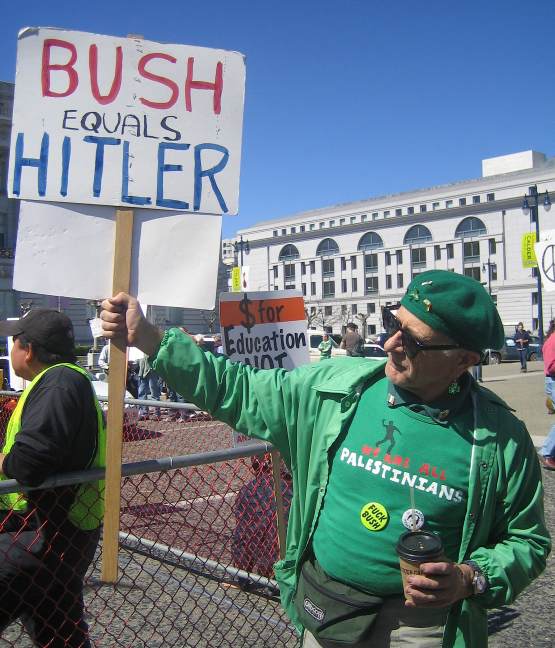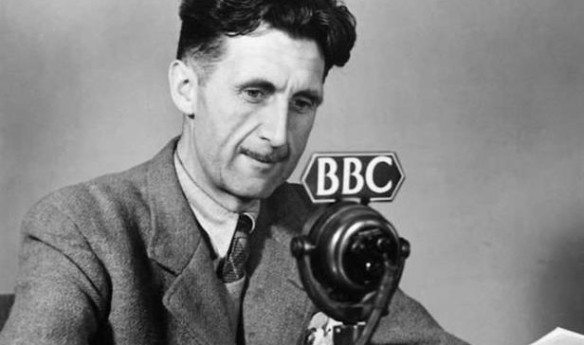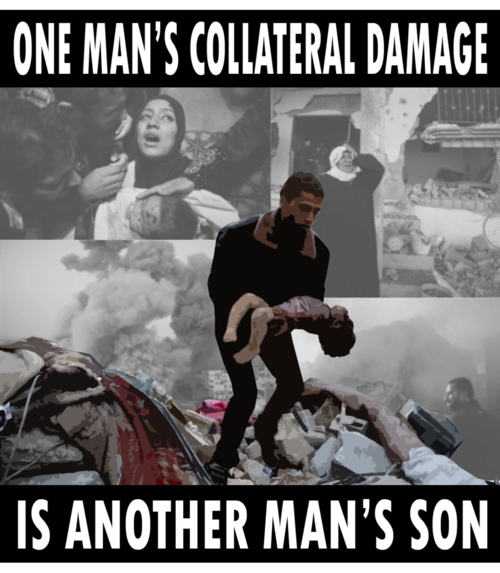This article with an intentionally awfully-punned title is about The Adolf Hitler of Language: Cliches
In 1946, George Orwell wrote his most well-known essay “Politics and the English Language” in which he describes how euphemism is used to conceal dangerous policies and acts committed by politicians and how clichéd phrases used in political discourse are lowering the room-temperature of debate to a level of such palatable mildness that it becomes substantially unbearable*.
What is most concerning perhaps isn’t necessarily that discourse is simply descending into people exchanging overused propagandistic statements, but that words which used to have and maintain such power are spoken/written so often (usually when not needed) that their effect and meaning becomes diluted.
It is evident that Orwell was right in some regards (I do disagree with him on some minor points but overall I think his essay is precise in its criticisms). Indeed, Orwell’s points can be applied to today’s discourse.
Euphemism is particularly dangerous as it subtly lacerates our minds by allowing us to succumb to the harmful, by believing what wishes to implement hurt onto us to be either: non-threatening or a nonchalant “everyday”.
Wars are called “armed conflicts”, terrorists are called “insurgents”, bombs are called “Improvised Explosive Devices”, areas which have experienced intense civil-wars between violent militia groups are said to be “destabilised regions”, war-crimes, genocide and slaughter en-masse are simply ignored in phrases which gloss over the events, such as, “humanitarian intervention”, and my most favourite of all: a phrase used when families have been flung out of their homes and made refugees is “the displaced”.
Pundits gleefully chuck around political-clichés like rabid cheetahs throwing around the dismembered heads and intestines of their prey. “It’s an us and them mentality”. “The Westminster Bubble”. “The Political Class”. “The Liberal Elite”. “Give The People what they want”. “We’re being robbed of our liberty”. “A Political Landslide”. “A Political Earthquake”. “The Loony Left”. “We’re living in a Nanny State”. “We’ll make Britain great again”. “The gap between rich and poor is at an all-time high/low”. “Boom and bust”. “Health and Safety gone mad”. “The Mainstream Media always does this”. “Parties like UKIP are just blaming the other” (identity politics has always been a bit of “a minefield”, when it comes to clichéd phrases)…
What is perhaps more disturbed is that – as already mentioned – powerful ideological words have become semantic-voids: “Political correctness”, “Socialism”, “Liberalism”, “Fascism”, “Racism”, “Homophobia”. Even “Democracy”. These shouldn’t be clichés or political-buzzwords or pieces of rhetoric employed – if I may adamantly use the cliché – “to score cheap political-points”. I hear Obama described as a socialist. I hear David Cameron being called a fascist. I hear phrases which ejaculate paradoxes of such intensity that it is like observing Ron Jeremy gushing out orgasms of thunderous nonsense-speak: “socialists hate poor people”, “liberals don’t like free-speech”, “**insert leader here** is just like Adolf Hitler” (Why is it when people wish to compare elected leaders to totalitarian ratbags, Hitler and Stalin are always the most popular choice?), and certainly the worst phrase – a phrase which exhausts superlatives – is “multiculturalism is white genocide”.

Hitler must take it as a compliment that his name is used as a piece of rhetoric employed to win debates…
Certain individuals seem to be under the guise that socialism and Stalinism are synonymous and that Liberalism isn’t about freedom of speech or a free press but actually just a synonym for what has been crudely termed “Cultural Marxism”. I must admit, I do cringe when I read articles or hear people who use “Left” and “Liberal” interchangeably.
Other peoples will then brand celebrities homophobic for using specific words (of course ignoring the context in which offensive/obscene language is used entirely). James Arthur once tweeted “fucking queer”. Does this really mean he dislikes gay people, really? He doesn’t. He’s just intensely…”insensitive”, with his language use. I’ve never been a particular fan of the word “homophobe” (and it’s derivatives). It’s a very limiting word and implicitly states that dislike for gay people is entirely due to fear – thus when you use the word against someone who doesn’t fear gays but is instead disturbed, disgusted or repulsed by them, the word seems so false that to the “homophobe” it becomes a useless word in and of itself. Thus, a vital question arises: do new words have to be formed, and indeed who should form them?
This progresses onto a more serious point. How can we discuss Homophobia or Islamophobia if the words themselves dictate entirely a whole situation? How can we understand prejudice if we only ever view it through the lens of “people fear what they don’t understand” (a cliché which is not only annoyingly overused but false in some circumstances).
Indeed, if we stretch this issue wider, how can anyone be persuaded by rhetoric and language if our sentences are toxicated with linguistic-poison? (Do forgive me for the melodramatic tone).
One of my favourite maxims is: A truth expressed badly is a lie. Language should be used to persuade and enlighten. How can we persuade and enlighten our fellow ignoramuses about poverty if we are restrained by only ever using phrases like “the gap between rich and poor”, how can we talk about an overly-protective universe, to our fellow creatures, if we only ever use phrases like “nanny state” and “health and safety gone mad”? The problem with clichés is that they are words and phrases so overused that their original intent and meaning has become severely pixelated. Thus, we have to conjure new expressions, phrases, words, and portmanteaus to express the same ideas. All debaters will know that the same ideas are recycled in debates, but how one expresses them is what matters: for the original turn of phrase makes the issue seem more relevant than it would if expressed via…a weakened mode of language.
Indeed these same points can be extrapolated onto issues regarding “armed conflicts” and the war-crimes which occur during them. People seem to be referring to civil-wars in Iraq and in Russia/Ukraine by not stating what is actually occurring and instead cloaking the issues behind opening a sentence such as: “The situation in Iraq”. What situation? There are multiple “situations” that occur in Iraq – and why is every foreign international event referred to as a “crisis” (this isn’t a middle-aged fedora-wearing IT-expert attempting to find his lost watch – we’re talking about politics infused with machete-off heads and children with bullet-wounds here). It gets more perturbed when certain pundits discuss what other nations and “foreign powers” are doing, will passively refer to the entire globe as “The International Community”. It’s hardly a “Community” – I don’t see much communal spirit, and when there is, it’s based on entirely false premises (the Olympics for example).
Henceforth, I think some rules need to be stated on how to write about politics without resorting to cliché:
1) If you’ve heard the phrase before or seen it “in print”, don’t use it.
2) Try and think of multiple similes or metaphors and use the one which seems most appropriate.
3) If you are to use a cliché, ensure to veil it in a salad of irony, you might wish to use quotation marks – I personal always put “110 percent” into doing this.
4) Refrain from being overly-sentimental, this is where most clichés seem to simper their way in.
5) If you are to use a political-insult, try and design a new phrase which expresses the same meaning. For example, rather than saying “champagne socialist”, you could use phrases like: “airport-lounge revolutionary”, “occado-communist”, “New-Statesman-subscribing Bolshevik” – or simply replace the word “champagne” with its sister-drink “Prosecco”.
6) Always question the names of political-parties. Most political-parties do not adhere to the ideology to which their title would subscribe. The Labour Party isn’t left-wing and The Conservative Party is hardly adopting the beliefs of Edmund Burke.
7) Never use euphemism. State facts. Don’t avoid events. Soldiers didn’t “pass away”, they died. If you wish to be emphatic you could use words like “massacre” or “slaughter” – but try not to over-use such words or be too emphatic with this type of tone as being so melodramatic is essentially the same as being euphemistic.
* George Orwell has also written another essay called “What is Fascism” where he explains succinctly and clearly why the term “Fascism” doesn’t have any semantic-worth and is simply used as a political-insult.



